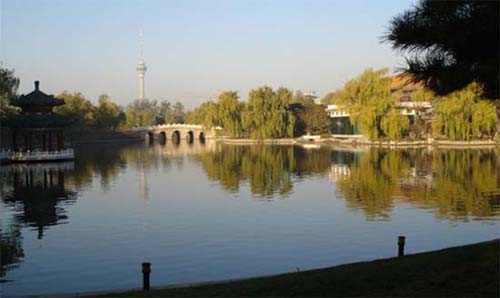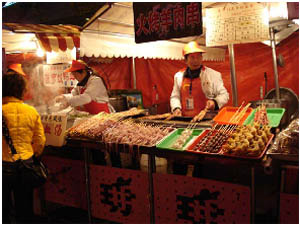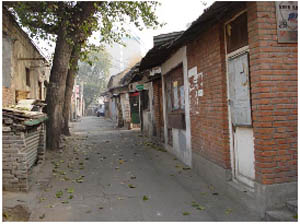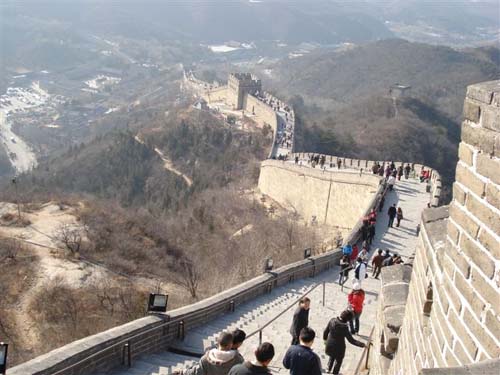Apr 19, 2025
Apr 19, 2025
I was invited by the Chinese Government to advice them in their rural energy program. Hence I had gone to Beijing at the invitation of UNDP and Office of National Energy Leading Group (ONELG) ' a group under the leadership of Prime Minister Wen Jiabo. ONELG has been charged with developing the Energy policy of China. A one day conference between Chinese rural energy and foreign experts was organized by ONELG. The Vice Chairman of ONELG Mr. Xu Ding Ming who is the energy czar of China was the chief guest during closing ceremony of the conference. After the conference he gave us a 100-course dinner in an exclusive restaurant attached to his ministerial office. All major Government ministries in Beijing have these 5-star restaurants in their buildings for official dinners. Every time we finished the food our plate would be whisked away by efficient bearers and a fresh plate of finest gold-plated China would be put in its place. Very thoughtfully, some of us who were not adapt at wielding chopsticks, were provided forks and knives. The venue of the conference was Diaoyutai State Guesthouse situated in the beautiful and picturesque Yuyuantan Park. It has 11 villas surrounded by beautiful lake and manicured lawns. Almost all the major Government meetings and conferences take place in this guesthouse. The first meeting of Chairman Mao and President Nixon took place in this guesthouse and all the American Presidents have stayed here. During this trip we were also interviewed by the Chinese Internet New service which has a 7-10 million readership. After a sumptuous lunch hosted by them in a 23rd storey revolving restaurant, we were shown the state of the art facilities of the news agency. The interview is available at this site. Chinese men are fascinated by full-face beards. This is because at best they can have only a goatee! Thus the bellboy at the downtown hotel where I was staying could not help but ask my permission to touch and admire my beard! Changing money at Bank of China was worst than getting dollars in any Nationalized Bank in India in 1980s. The rest of China has changed, but Bank of China is still operating in Mao's times. So after wasting half an hour for my turn (the lady teller had gone for a cup of tea and to chat with her colleagues), I just went to an ATM in a private bank and got the money by using my Credit Card ! Language is the biggest barrier in China. Though Olympic games are barely 7-8 months away, hardly any Beijing taxi driver can speak or understand English. Hence the best thing is either to get the hotel staff to write down the address for you in Chinese or to ask you friend or host to speak on a cell phone to the taxi wallah for directions! Because of the language problem I was double charged on my credit card by the hotel staff. I still have to recover that money though the staff admitted to their mistake. Getting a local SIM card for your cell phone is a must. Because of language problem the prices of the cards can vary widely. It is better to get a local person to bargain for it. Bargaining for all goods is just like in India and normally one can bring down the cost by one fourth of what is initially asked for. The cycles are in abundance all over China, though in Beijing they are being rapidly replaced by electric bikes and cars. With increase in vehicular pollution most of the cycle riders cover their noses with a surgeon's mask. The taxi drivers drive rashly and very often encroach into the cycle lanes thus inconveniencing the cyclists. Almost all the cycle rickshaws are now off the road. One is lucky if one can see one or two old and tattered ones being pedaled around. The taxi drivers though are courteous and take you to your destination by the shortest route. I took many times the taxi and never felt cheated though at one time he took me in a round about way but this could be because the instructions given to him on the cell phone by my host were little confusing. There is frenzied activity of putting new buildings in Beijing because of 2008 Olympic games. All over the place high-rise buildings are being erected. This sometimes snarls the traffic and there are frequent traffic jams in Beijing. Surprisingly there was little air pollution even during the cold month of November. Downtown Beijing resembles any modern European or American city with large number of high-rise buildings and broad roads which are full of cars and electric buses. The older part of Beijing though is like any Indian city with scores of small shops, chockfull of goods spread all over the place, roadside cycle repair shops, even an occasional cobbler (mochi) and roadside eateries. There has been complete westernization of Beijing. Everybody wears jeans and shirts. Except for the official function of ONELG where the hostesses were in traditional Chinese dresses everybody wears western dresses. Even the official gift shop at the entrance of Great Wall of China sells tea shirts and mostly western goods. The background music in the shop was also an American pop song. Almost every street in downtown Beijing has either a McDonald or Kentucky Fried Chicken or Pizza Hut. It is really surprising that with such good Chinese food these eateries still thrive. They are frequented mostly by young people and children. In Forbidden City sometime back Starbucks was the only coffee shop till somebody raised a ruckus and it was removed. As a part to showcase rural development we were taken to a state of art chicken farm about 100 km north of Beijing. The 400 acres facility which is the largest in China is situated in very picturesque mountain settings with apple orchards all around it. We never saw a single chicken on that farm since we were not allowed inside because of quarantine and safety considerations. Hence we were given the virtual tour through the real time video cameras. The farm produces 2 million eggs/day and has a one MW most modern biogas power plant running on bird droppings. As usual the buffet lunch in the farm canteen was sumptuous and extremely delicious. The apples from the orchards, which are fertilized by the manure from the chicken farm, were simply out of this world. We also learnt of a novel Chinese concoction of warm Coca Cola with ginger as a cure for cold and running nose! During our trip to the chicken farm we saw a huge line of trucks (almost 10-15 km long) standing on the highway and jamming the traffic. The traffic for the cars was diverted so we could reach the farm. It seemed there is a serious shortage of diesel fuel in China and these trucks were lined up to fill their tanks. Some truck drivers have to stand for almost 10-12 hours in these lines. The China trip is not complete without a visit to the Great Wall. We went to Badling area which has a spectacular view of the Wall. Our guide kept on insisting that we take the sliding rail. However I insisted on climbing. So from the parking place to the highest point was a straight climb of about 3500 ft. The up and down trip took me about 2.5 hours. The scenery was fabulous and the climb was good for the circulation. Climbing the Wall reminded me of pilgrimage to Kedarnath - Badrinath Temples in Himalayas. So I prayed at the top of the Wall that China and India should be partners for the future of the world. There were hardly any fat people to be seen on Beijing roads. The only fat people I saw in the Great Wall of China were American and European tourists. A marching band from North Ohio State University U.S.A. was being filmed at the first landing of the Great Wall of China. Almost all these band members were overweight and hence they could not climb the wall and thus were being filmed at the first landing. The general cleanliness at almost all the places is amazing. Though Chinese spit all over the place just like Indians I saw whole battery of blue clothed cleaning persons pick up papers, garbage and clean the spits from the roads at all places almost round the clock. They were backed by mechanized truck road sweepers and cleaners. The bathrooms in public places like Temple of Heaven would put to shame even some of the 5-star hotel facilities in India. I never found a dirty public toilet anywhere in Beijing. One cannot leave Beijing without the experience of getting a foot massage. This massage which is a combination of acupressure therapy and Ayurvedic massage does wonders to the body through the foot. The one and a half-hour message is very soothing and on the last day of my Beijing trip after the massage I caught the midnight flight to Singapore and so slept like a log on the plane. Usually I am unable to sleep on the planes.
 China is a gourmet's delight. Even the roadside food vendors dish out delicious fare, though one should be careful about what to eat since choices range from snakes, eels, strange-looking sea creatures etc. Language is a major problem. However since everything is displayed one can safely opt for chicken, beef or mutton dishes by pointing them out. The place on Wangfujing Road in downtown Beijing resembles eateries on chowpatty in Mumbai. In small, neat and well-lighted small shacks one can get all sorts of delicious food at one fifth the price of that in fancy restaurants.
China is a gourmet's delight. Even the roadside food vendors dish out delicious fare, though one should be careful about what to eat since choices range from snakes, eels, strange-looking sea creatures etc. Language is a major problem. However since everything is displayed one can safely opt for chicken, beef or mutton dishes by pointing them out. The place on Wangfujing Road in downtown Beijing resembles eateries on chowpatty in Mumbai. In small, neat and well-lighted small shacks one can get all sorts of delicious food at one fifth the price of that in fancy restaurants. Because Beijing authorities want to show the city in good light to the tourists who will visit during the Olympic games large scale modernization of hutongs (old city) is taking place. This includes broadening the lanes in these hutongs without adequate compensation or consideration for welfare of the inhabitants with the result that quite a number of the old residents now have to live in their small and crammed houses.
Because Beijing authorities want to show the city in good light to the tourists who will visit during the Olympic games large scale modernization of hutongs (old city) is taking place. This includes broadening the lanes in these hutongs without adequate compensation or consideration for welfare of the inhabitants with the result that quite a number of the old residents now have to live in their small and crammed houses.
13-Jan-2007
More by : Dr. Anil Rajvanshi